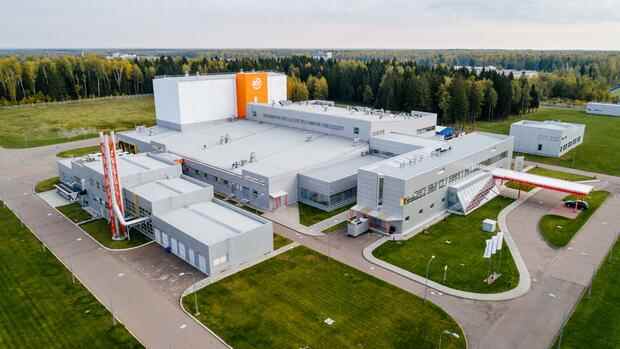Frankfurt At internal meetings, Stada boss Peter Goldschmidt has had to mediate between employees from Ukraine and Russia himself, and not just since Russian troops invaded the neighboring country. “For understandable reasons, there are personal emotional tensions between Ukrainians and Russians, but of course also between other nationalities in our workforce,” he told Handelsblatt.
Many employees have had personal experiences with the other population group, some of which also go back to their parents’ generation. “My appeal then is that our very first task is to get the medicines to the people,” says Goldschmidt. “In order to achieve this goal, personal feelings and political convictions have to take a backseat to the job,” he says.
In the Ukraine war, Stada and the natural medicine manufacturer Bionorica are standing between the fronts, so to speak, because they are active in both countries. The fact that other companies stop doing business in Russia to send a clear political signal is out of the question for Stada. One puts the care of patients first, says Goldschmidt – “regardless of nationality or political beliefs”.
The company from Bad Vilbel has been represented in Russia since 2004. Two large factories and around 2,100 employees play an important role in supplying the local population with medicines. Vital medicines for cardiovascular diseases, diabetes or cancer are among them, but also over-the-counter medicines. Stada achieves around 420 million euros or 14 percent of the total turnover of three billion euros in Russia.
Top jobs of the day
Find the best jobs now and
be notified by email.
The company also produces medicines in Ukraine. Stada recently achieved a little more than one percent of its sales in the country. The factory is fully functional, but currently only maintenance work can be carried out there. There have been attacks on the region near the Kyiv military airport where the factory is located.
As of today, the colleagues are healthy and the building is not damaged, reports Stada boss Goldschmidt. Only a few employees are still on site. Many took care of their families, others are on the run. Still others help the doctors and provide support in the hospital. Stada paid the approximately 440 employees in Ukraine the wages for March and April in advance so that they have financial flexibility and, among other things, also sent trucks full of medicines to Ukraine.
Ukraine and Russia are also important markets for Bionorica
Bionorica owner Michael Popp sees it similarly. For the manufacturer of natural medicines, Russia and the Ukraine are the two most important foreign markets. The company has been in contact with doctors, pharmacists and researchers there for years. “For Bionorica, taking care of patients in both countries is a top priority. According to current international law, medicines are a valuable asset to which patients should always have access.
The company had canceled the balance sheet press conference planned for Monday at short notice. Reason: Management and many employees are busy organizing relief measures for the approximately 130 employees and their families in the Ukraine. This also includes accommodation options in the neighboring countries of Ukraine or in Germany.
In 2020, Bionorica achieved around eight percent of its sales of a total of 289 million euros in Ukraine, with Russia even accounting for 34 percent. The company has a sales organization in both countries, and around 300 people work in Russia.
For the Bionorica owner, Russia and the Ukraine are the two most important foreign markets.
(Photo: Lars Langemeier)
Bionorica manufactures medicines from plant-based active ingredients and has a focus on cold remedies. Production takes place exclusively at the headquarters in Neumarkt in der Oberpfalz. Because of the great importance of the Russian market, company owner Popp decided a few years ago to invest around 40 million euros in the construction of a plant in Voronezh in southern Russia.
The plant, in which medicines are to be assembled and packaged, has not yet been put into operation due to the pandemic. Despite the war and sanctions against Russia, Bionorica intends to continue at the location, which should enable patients in Russia, Belarus, Armenia and Central Asia to be cared for and up to 60 jobs to be created, the company says on request.
Difficult search for truck drivers
At Stada, the main focus in Russia is currently on the topic of the supply chain. Although Stada produces most of the drugs locally. A smaller proportion also comes from Serbia or Germany. “We have to make sure that the supply chain works. Within Russia and also into Russia. There are logistical challenges,” says CEO Goldschmidt.
For example, it is difficult to find truck drivers who drive to Russia. “But the advantage of our industry is that because it’s about pharmaceuticals, there is still a dialogue. We are in contact with the embassy, the Eastern Committee and the Chamber of Foreign Trade,” said the STADA boss.
“The advantage of our industry is that because it’s about pharmaceuticals, there is still a dialogue.”
(Photo: Stada Arzneimittel)
It is obvious that the war in Ukraine and the consequences of the sanctions will also affect companies like Stada on a business level. However, Goldschmidt is convinced that the manufacturer can cope with any losses in these countries. “The mixture of exchange rate pressure and the decline in the Russian economy will definitely leave its mark, but we will master it thanks to our broad geographical positioning and our broad portfolio,” says the Stada boss.
The consequences of the war for Bionorica’s business cannot yet be estimated. But the owner Michael Popp has already decided that in Russia in the near future they do not want to increase product prices to the extent that the ruble has lost value in the meantime. Because patients should continue to be able to afford the drugs, according to Neumarkt.
More: Delivery routes to Russia are collapsing – ships are backing up in Europe’s ports
